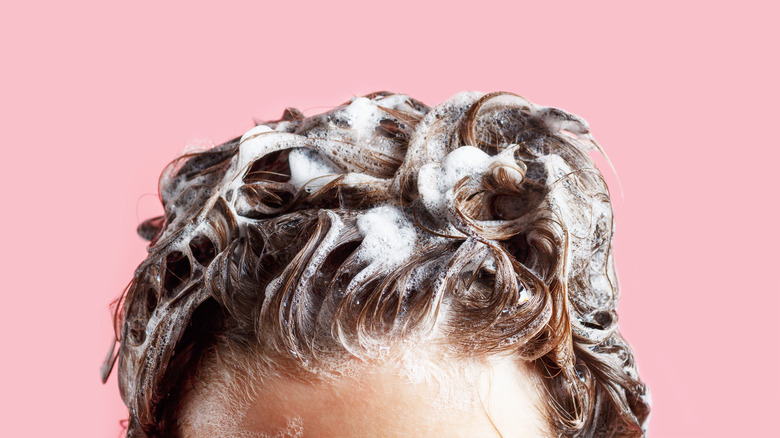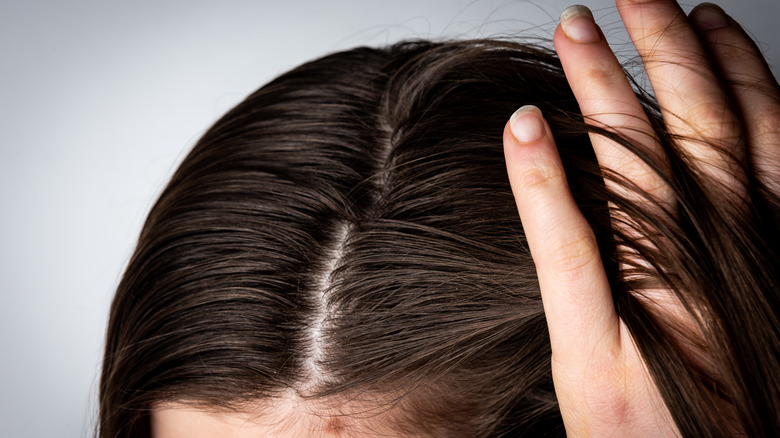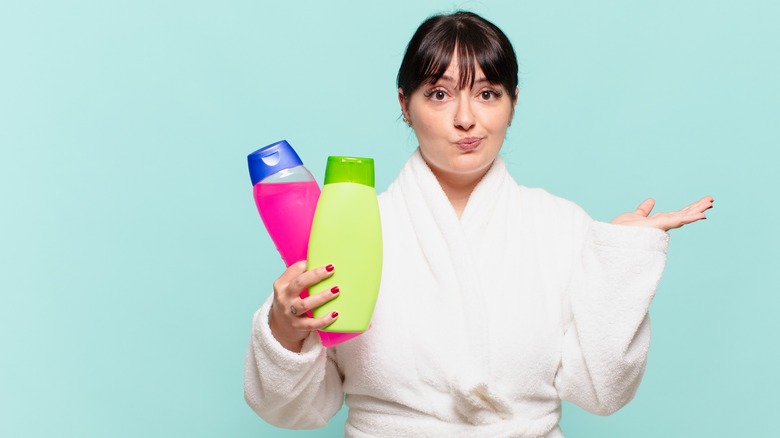Why Cheap Shampoo Might Be Worth A Closer Look
Sometimes, all it takes is a break from your normal routine to cause you to rethink the way you're doing things. Take shampooing your hair. If you're someone who does this every day, a beach vacation could be just the impetus for change that makes your hair healthier than ever. Changing your routine at home may not occur to you, but if you're away, you may wonder why you should bother washing your hair when you plan to spend part of the day in the water, part of the day romping in the sand, and all day in the wind. Better to clip up your hair or gather it in a ponytail and shampoo your hair when it really needs it, right?
Now you're onto something. When you finally let your hair down, you'll see that it's in far better shape than you thought it would be. Maybe it's oilier than usual, but the oil can make your hair easier to manage too. It could cause quite the dilemma — and not only because you pride yourself on being hygienic. As Healthline explains, Americans are preoccupied with cleanliness, sometimes to their own peril. In this case, daily shampooing can dry out and damage hair — a condition you may not even recognize because it's become the norm.
If you're willing to consider shampooing your hair only when it needs it, then you should also be open to alternatives to your regular shampoo, including using a cheaper brand.
Use shampoo the right way
It may come as a surprise that shampoo is formulated to clean and remove oil from your scalp and roots rather than your entire head. In fact, working shampoo all the way through to the ends of your hair can eventually dry it out, Healthline says. It's better to focus about 2 teaspoons of shampoo on your scalp (via Head & Shoulders) and let the ends get clean as the lather trails down to the ends. How many times a week you should repeat this exercise can vary, but only people with extremely oily hair may need to use shampoo every day (via Good Housekeeping). For everybody else, two or three times a week should suffice.
Oiliness is a big determining factor in how often you should wash your hair, but it's not the only one. Your hair type plays a role, too, with thick, wavy, or curly hair generally needing less washing. Thin or straight hair usually contains more sebum (a natural oil). How many, how much, and which type of styling products you use matter too. They can build up and leave hair feeling heavy and limp.
Keeping your activity and perspiration levels in mind, Healthline advises shampooing hair when you notice excessive oil production and your hair feels greasy. For some people, this translates to "co-washing," which means "conditioner-only washing" and forgoing shampoo entirely (via Real Simple). Understandably, then, people who decide to shampoo less often may be more amenable to taking a closer look at the shampoo they use, as well as its price.
Ingredients make the difference
Placing a lesser premium on the importance of a daily shampoo makes it easier to scrutinize the shampoo itself, and many people are choosing to look for alternative (and less expensive) ways to clean their hair and scalp. Healthline has noticed the shift, noting that more people are shampooing less, instead choosing to allow their naturally-produced oils balance their scalp and often using only plain water.
Even the experts have noticed that the differences between high-priced shampoos and store brands have diminished. As cosmetic chemist Victoria Fu told Well + Good: "We're almost certain most shampoo products are able to perform their main function of cleansing pretty well. We wouldn't splurge on this category since most of the functional ingredients to cleanse hair are pretty much the same across mass and luxe brands."
Celebrity hairstylist Tarryn Feldman agreed, telling Elle, "So many smaller brands are getting rid of all the harsh chemicals that categorize them as drugstore brands. In other words, drugstore brands have stepped up their game to produce more [higher-end quality products]." Perry Romanowski, a cosmetic chemist, was even more direct, telling Well + Good that people should "skip expensive shampoos." It's the conditioner that really matters, he says, and if you use a good one, then which shampoo you choose isn't all that important.
Victorian women knew this to be true, out of necessity. In their day, before shampoo was invented, they would crack several eggs over their head and work the egg white and yolk into a lather before rinsing it out (via History Things). Today, it sounds like a compelling TikTok video on the value of cheaper "shampoos" — and how it can pay to keep an open mind.


